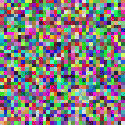
October 25, 2009
INPUT/mind/OUTPUT/mind
A writing revolution

Nearly everyone reads. Soon, nearly everyone will publish. Before 1455, books were handwritten, and it took a scribe a year to produce a Bible. Today, it takes only a minute to send a tweet or update a blog. Rates of authorship are increasing by historic orders of magnitude. Nearly universal authorship, like universal literacy before it, stands to reshape society by hastening the flow of information and making individuals more influential.
To quantify our changing reading and writing habits, we plotted the number of published authors per year, since 1400, for books and more recent social media (blogs, Facebook, and Twitter). This is the first published graph of the history of authorship. We found that the number of published authors per year increased nearly tenfold every century for six centuries. By 2000, there were 1 million book authors per year. One million authors is a lot, but they are only a tiny fraction, 0.01 percent, of the nearly 7 billion people on Earth. Since 1400, book authorship has grown nearly tenfold in each century. Currently, authorship, including books and new media, is growing nearly tenfold each year. That’s 100 times faster. Authors, once a select minority, will soon be a majority.
We, the creators of the free information society, mean to wrest from the bourgeoisie, by degrees, the shared patrimony of humankind. We intend the resumption of the cultural inheritance stolen from us under the guise of "intellectual property," as well as the medium of electromagnetic transportation. We are committed to the struggle for free speech, free knowledge, and free technology. The measures by which we advance that struggle will of course be different in different countries, but the following will be pretty generally applicable:
By these and other means, we commit ourselves to the revolution that liberates the human mind. In overthrowing the system of private property in ideas, we bring into existence a truly just society, in which the free development of each is the condition for the free development of all.
- Abolition of all forms of private property in ideas.
- Withdrawal of all exclusive licenses, privileges, and rights to use of electromagnetic spectrum. Nullification of all conveyances of permanent title to electromagnetic frequencies.
- Development of electromagnetic spectrum infrastructure that implements every person's equal right to communicate.
- Common social development of computer programs and all other forms of software, including genetic information, as public goods.
- Full respect for freedom of speech, including all forms of technical speech.
- Protection for the integrity of creative works.
- Free and equal access to all publicly-produced information and all educational material used in all branches of the public education system

October 24, 2009
Information, memory, & time travel: a tangential thought experiment
The scheme seems ingeniously simple and technically feasible. To overcome oblivion, say the authors, all you need are sensitive miniature sensors and several terabytes of storage, which are already or soon-to-be affordable. You can then record every minute of your life using video, audio, location and physiological signals, culminating in the commitment of this endless stream of information to your personal MyLifeBits account in your pocket and/or in cyberspace. Proper software will permit you to retrieve the information years later, and it will even pass by default to your progeny for eternity, with the hope that they will pay attention to it.
New Scientist: "Memory & Forgetting In The Digital Age" by Yadin Dudai
Dudai brings up some valuable criticisms of the claims being made by the authors, representing a certain faction of technologically minded futurists.
More worrisome than the idea itself is the prevailing assumption that such a recall would in fact be total. Even in its most outlandishly comprehensive form, such technology would merely opportune an augmented reiteration of a numerically unique prior occurrence. Assuming the commonly held empirical view of time, experiencing such a recollection would, no matter its immersiveness, retain distinction, even if only by merit of such numeric identity.
Let's suppose such a device has been built and that it is able to record and induce a recollection so immersive as to be indistinguishable from the original experience. By means of Brain-Computer Interface (BCI, yet another emerging innovation) the device thoroughly records the user's external context as well as affected perceptions and corresponding mental states. In fact the user of this device becomes so immersed in the recollection that he or she would have no idea that it was in fact a recollection, their brain state having been reverted to the time of the initial occurance. They may have forgotten the intervening memories, or else are unable to recollect them. Either way, they essentially live the experience as if for the first time. Of course, when the user is brought back to the present, they become aware of having gone back into their archived past. This shift may be disorienting, or perhaps as banal as turning off a television. Either way, they now have knowledge of having lived the experience, archived it, and subsequently recalled it. All the while, they are recording information. This means they may now recollect recollecting.
What happens when they step back into the moment of stepping back into another moment? Deffering any conclusions bearing resemblence to popular science fiction, this shows that even the most immersive recollection will retain its numerical uniqueness, if only in retrospect.
